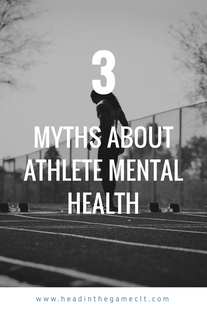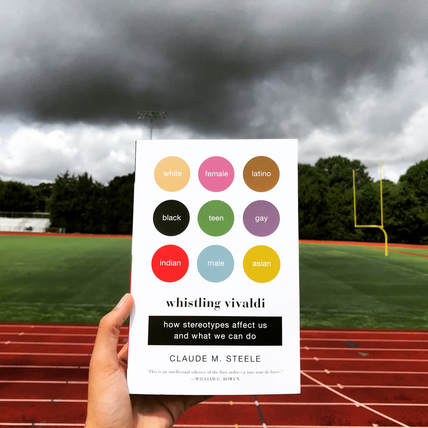 Each year our faculty is assigned a book for our very own "summer reading". Fortunately, throughout the years I have really enjoyed the selections. This year is no different. We are to read Whistling Vivaldi: How Stereotypes Affect Us and What We Can Do by Claude Steele. I just started reading yesterday, and I can't wait to finish. Steele focuses on the effects of stereotype threat on performance, attitudes and beliefs, both about others and ourselves. As I was reading I began to think about athletes and their mental health. Does stereotype threat affect athlete performance? Of course it does, Steele talks about this in Whistling Vivaldi. Internalized views of yourself can help, and hinder, your athletic performance. Does stereotype threat prevent athletes from seeking out help when they need it? Maybe, but I know my Athletic Training room was always packed full with athletes waiting to tell me about their most recent physical ailment. Does stereotype threat prevent athletes from seeking out help for their mental health? Well, I am not necessarily an expert, but I do know that my counseling office has been extremely empty compared to my athletic training room. I will definitely give a full review of Whistling Vivaldi when I am done reading and processing, but wanted to leave you with these three myths that are impacting our athletes mental health. The more we talk about the truth behind athlete mental health, the smaller the threat will become. Three Myths About Athlete Mental Health1. Athletes exercise all the time, and exercise is good for your mental health, so athletes shouldn't have any problems with mental illness.
It is true that exercise has significant benefits on mental health, but for some athletes their sport becomes all encompassing. The desire to perform at your best each day and the pressure athletes feel to be perfect can be detrimental for their mental health. 2. It is better to see a Sports Psychologist than a Mental Health Professional. I think the correct thing to say is it is more acceptable to see a Sports Psychologist than a Mental Health Professional. Sports Psychologists work to help players enhance performance, recover from injury, and develop mental skills to increase sport productivity. But, athletes are more than their sport, and Sports Psychologists do not specialize in mental illness or coping with problems outside of sport. 3. The majority of athletes stressor's are related to their sport. Athletes are people too. I am going to say it again, athletes are people too. While they may be more comfortable talking about problems in their game, they also experience everything non-athletes do. Academic difficulties, life transitions, relational dysfunction, grief, and poverty are all stressors athletes face daily that are then compounded by poor performance on the court or field. What books are you reading this summer? Do you have thoughts on the "athlete stereotype?" Have you read, Whistling Vivaldi? * Because I believe in full disclosure, I use Amazon Affiliate links and will make a small amount of money, at no extra cost to you, if you purchase any products using the link provided.
2 Comments
6/3/2023 04:04:16 pm
I completely agree with you. The stigma around mental health can be particularly challenging for athletes, who are often expected to be strong and resilient. It's important to debunk the myths surrounding athlete mental health and emphasize the importance of seeking support. Creating a safe and supportive environment for athletes to address their mental health needs is crucial for their overall well-being and performance. I'm also interested in reading the full review of "Whistling Vivaldi" to gain a deeper understanding of this topic.
Reply
Leave a Reply. |
Christina TaylorFormer Athletic Trainer, current Mental Health Professional. Boston sports lover. Archives
December 2023
Categories
All
|


 RSS Feed
RSS Feed